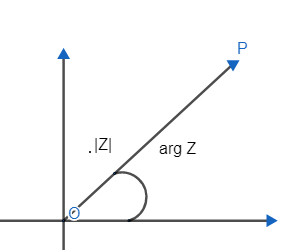Question
Question: If modulus and amplitude of a complex number are 2 and \(\dfrac{2\pi }{3}\) respectively, then the n...
If modulus and amplitude of a complex number are 2 and 32π respectively, then the number is:
(A). 1i3
(B). 1+i3
(C). −1+i3
(D). −1i3
Solution
Hint: We will be using the concepts of complex numbers to solve the problem. We will be using a modulus and arrangement way of representing a complex number. We know that the modulus of a complex number Z=x+iy is ∣Z∣=x2+y2 and argument of a complex number is the angle between positive real axis in complex plane and vector OP.
Complete step-by-step solution -
Now, we have been given the modulus and amplitude of a complex number as 2 and 32π respectively and we have to find the complex number.
Now, we know that a complex number can be represented as

Z=∣Z∣ (Cos arg z + i Sin (arg z))…………….. (1)
Where ∣Z∣=x2+y2 is the modulus of the complex number.
arg=tan−1(xy) and arg z lies between −π to π also in diagram we can see that arg z is the angle between positive real axis and vector OP.
Now, we have been given that the modulus of complex number is 2 and the arg z is 32π. Therefore, from (1) the complex number is Z=2[cos(32π)+isin(32π)] .
Z=2[−21+2i3] .
Z=−1+i3 .
Hence, the correct answer is option (c).
Note: To solve these types of questions it is important to draw a figure representing the complex number then use the appropriate formula. Like in this case modulus and argument from to represent the answer.
